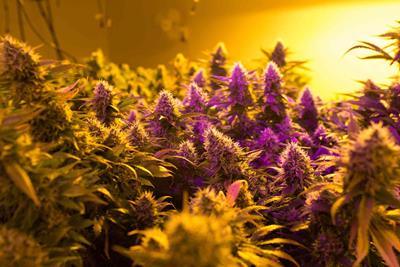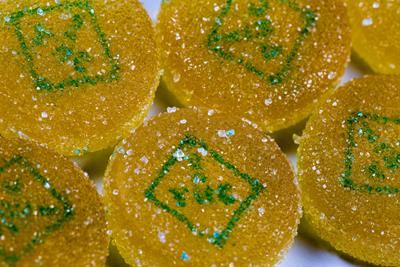
Thursday April 15, 2021
By Erin Hiatt
Reviewed By Mohammad Ashori, M.D. on Monday February 28, 2022
 Education
Education
Think that Delta-9 THC is the only cannabis compound that can get you high? Think again, because there’s a new cannabinoid in town. Meet delta-10 THC, a close molecular relative to delta-9 THC (famously known as the cannabinoid that causes the euphoric high), and delta-8, which will also get you high but reportedly less intensely than delta-9.
Most of what we know about delta-10 at this point is that we don’t know much of anything, but some are taking what we understand about how cannabinoids interact with the endocannabinoid system, primarily the CB1 receptor, and applying the same logic to Delta-10.
Why Are There Different THCs?
If you think back to your chemistry classes, the term “delta” refers to a chemical reaction in which heat is the catalyst (hence the decarboxylation of raw cannabis to unlock a cannabinoid’s effects). As for the numbers that follow the “delta” designation, this refers to their place on the carbon chain. Delta-8 bonds to the eighth carbon chain, delta-9 on the ninth, and delta-10 on the tenth.
What We Know about Delta-10 THC
If consumer enthusiasm for delta-10 is anything like what we’ve seen so far with the delta-8 products that have recently caught fire in the cannabis world - expect to see a lot more of it hitting dispensary shelves. However, knowing any potentially healing or mental effects is a long way off. One study evaluated delta-10 in pigeons to understand some of the compound’s effects and found that it delivered a less potent high than delta-9. Interesting, yes, but pigeons to humans? We’ve got a ways to go.

Stories about this new cannabinoid's effects on humans are at this point totally anecdotal, but this is what we’ve heard so far:
An Overview of Delta-10 THC
- Delta-10 can and will get you high, but is thought to have lower psychotropic effects
- It is thought to promote energy, focus, creativity, and alertness without the raciness, paranoia, or anxiety some experience with delta-9
- Expect that delta-10 will show up on a drug test just like regular ole’ THC, because it results in the same THC-COOH metabolite that most tests screen for
As cannabis legalization has become more widespread and the stigma around its use growing less with each passing year, researchers have been digging in on cannabinoids and their myriad effects and applications. Least of all to help the many patients who are using medical marijuana for their chronic medical conditions. But how did a cannabinoid like delta-10 seemingly emerge out of nowhere?
Where Does Delta-10 THC Come From?
Delta-10 erupted onto the scene only recently, and its origins cannot be 100% confirmed. Currently, the story goes that Adelanto, California cannabis company Fusion Farms purchased outdoor-grown biomass to produce concentrates. What they didn’t know is that the cannabis they purchased had been treated with a fire retardant to protect the grow from California’s perennial wildfires.
Unaware of the contamination, Fusion pressed forward with the extraction but noticed shortly thereafter that unusual crystals with an unfamiliar structure were forming. The folks at Fusion tested the extraction and found that it was most similar to CBC (cannabichromene), but not an exact match. Fusion sent the distillate to a licensed testing facility to nail down what they had on their hands, and after several months of back and forth, the cannabinoid was finally identified as delta-10 THC.
What’s Next for Delta-10 THC
Discovering a new cannabinoid through the process of contamination via fire retardant, needless to say, is not ideal (or healthy), so labs have been working to produce more delta-10 by utilizing healthier and more eco-friendly food grade additives to act as a catalyst. Though booming with interest, few companies have brought the cannabinoid to market. To our knowledge, Delta Extrax is among the first.
With delta-9, we know that it has been and continues to be thoroughly researched, and we have an understanding that it can help with pain, nausea, vomiting, and lack of appetite, but may also cause or exacerbate anxiety and paranoia. As it stands currently, we have no such understanding of Delta-10.
Furthermore, its legality is also unclear. The DEA has said that “all synthetically derived tetrahydrocannabinols remain Schedule I controlled substances,” and on its face that seems to include delta-10. However, if delta-10 comes from hemp-derived CBD it might be legal-ish. This confusion stems from the 2018 Farm Bill, which legalized industrial hemp but did not legalize CBD (I know, it’s hard to believe, but despite CBD’s enormous popularity it still resides in a legal grey area).
Final Thoughts
As the cannabis industry continues to expand and its legality hopefully comes into clearer focus, expect to see more innovations like delta-10 come to a dispensary near you. However, caveat emptor applies heavily here. When trying novel products, remember to follow the cannabis rules: start low and go slow, only buy products from licensed, legal dispensaries and sources who can tell you where the cannabis was sourced and how it was made, and make sure to look at the COA (certificate of analysis) so you can see that the products were tested for cannabinoid content, terpenes, toxins, and impurities.
What do you think of this brand-new cannabinoid? Share your thoughts on delta-10 THC in the comments!
Photo Credit: Daniel OberhausFollow (license)








